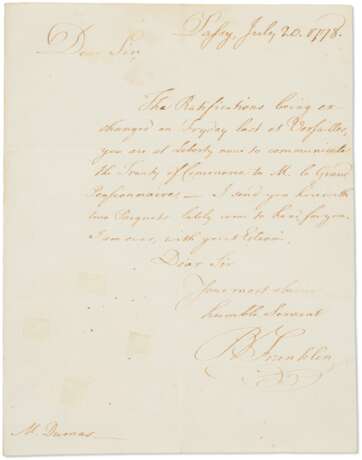ID 517656
Lot 10 | On French recognition of American independence
Estimate value
$ 20 000 – 30 000
One page, bifolium, 200 x 156mm (light toning toward upper margin, minor glue remnants at lower left). Matted and framed to reveal both sides.
Franklin autorizes a copy of the French treaty recognizing American independence be tranmitted to the Netherlands. Franklin writes Dumas, acting as an envoy for the States-General of Holland that now that "The Ratifications being exchanged on Fryday last at Versailles, you are at Liberty now to communicate the Treaty of Commerce to M. le Grande Pensionnaire.–" and forwards "two Pacquets [not present], that had recently come into his possession.
On 8 January 1778, follow a year of covert support for the American Revolution, Vergennes informed Franklin and the other American envoys in Paris that France had decided to form an alliance. Two treaties were drafted: one a formal treaty of alliance as well as a treaty of amity and commerce, the latter of which made France the first nation to recognize the Independence of the United States. On 4 May, Congress ratified both treaties, copies of which reached Paris in July with a stipulation that two articles to the Treaty of Amity and Commerce, concerning import duties and exports of molasses, be expunged—a provision agreed to by Vergennes on 17 July 1778 (See American Commissioners to the President of Congress, 20 July 1778, Papers of Benjamin Franklin).
The recipient of this letter, Charles-Guillaume-Frédéric Dumas (1721-1796), was a diplomat based in the Netherlands, and had been employed by Franklin as a secret agent to advance American interests in Europe. When Congress sent John Adams as the first American Minister to the Netherlands, Dumas served as his secretary and interpreter. "M. le Grand Pensionnaire," was Pieter van Bleiswijk (1724-1790) who served as Grand Pensionary of Holland (a post akin to a prime minister) from 1772 to 1787. Provenance: Parke Bernet, 3 December 1963, lot 70.
| Address of auction |
CHRISTIE'S 20 Rockefeller Plaza 10020 New York USA | ||||||||||||||
|---|---|---|---|---|---|---|---|---|---|---|---|---|---|---|---|
| Preview |
| ||||||||||||||
| Phone | +1 212 636 2000 | ||||||||||||||
| Fax | +1 212 636 4930 | ||||||||||||||
| Conditions of purchase | Conditions of purchase | ||||||||||||||
| Shipping |
Postal service Courier service pickup by yourself | ||||||||||||||
| Payment methods |
Wire Transfer | ||||||||||||||
| Business hours | Business hours
|




